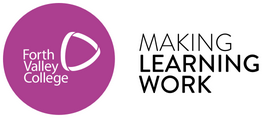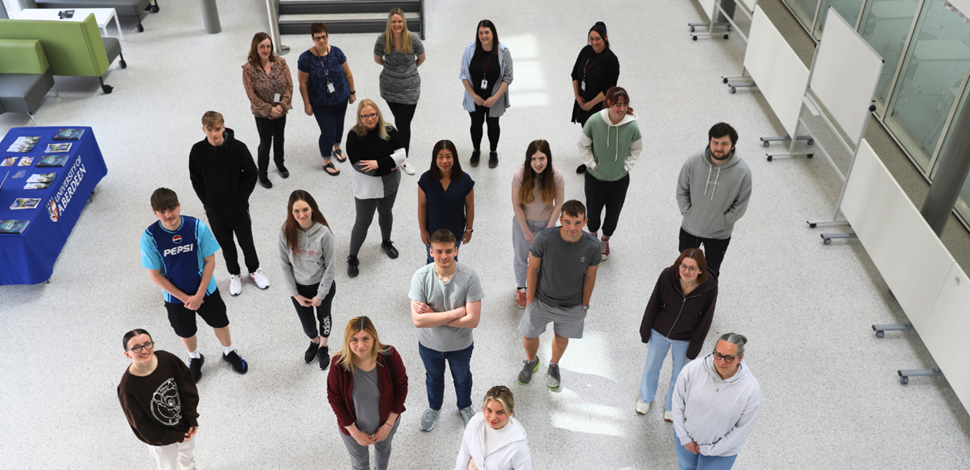Forth Valley College’s Hybrid Learning model has continued to gather pace with different curriculum departments throughout the 2022/23 academic year.
The approach, which combines traditional face-to-face instruction with online learning components, has enabled Higher National (HN) and PDA programmes including: Childcare Practice, Administration & IT, Accountancy, Business, Healthcare Practice and Social Services, to successfully deliver a hybrid curriculum for the benefit of students and staff.
These departments took the decision to split unit content into both on-campus and online delivery. This allowed specific on-campus days during which students could attend classes and collaborate with both lecturer and classmates in College, with other learning taking place online, where lessons were recorded so that students could review content and complete tasks at their own pace.
As part of a College case study into hybrid learning, Jennifer Nisbet, Learning and Digital Skills Project Lead, conducted interviews with lecturers, managers and students, to explore the advantages and challenges of implementing a hybrid learning curriculum and its impact upon the learning and teaching experience at the College.
Jennifer, said: “Key advantages of a hybrid approach are evident in terms of flexibility and personalisation of the learning experience. Curriculum departments have been able to offer units that cater to students’ individual needs and learning styles, and incorporate a variety of resources and interactive activities which build engagement and motivation among students.
“The flexible learning environment which hybrid learning has provided gives students the freedom to learn at their own pace and in their preferred setting. The online components offer flexibility in terms of accessing course materials and participating in discussions, allowing students to balance their academic commitments with work, family, and other responsibilities.”
An HNC Childcare Practice student said: “For me, it works well – I enjoy the mix of being on campus with the other students and then working online on different sorts of tasks. Being on campus is good for building rapport with other students in the class, and now that we have built a good relationship, we work well online together.”
Another student, said: “Having some classes online has really helped because I don’t have to travel to College every day and can have my child at home, while studying online.”
Hybrid learning delivery has also enabled students to access a diverse range of learning resources, including self-directed study, group tasks, projects, group discussion forums, and recordings, all of which cater to different learning preferences, ensuring a more personalised and inclusive learning experience for students.
Jennifer went on: “The integration of face-to-face and online delivery has also stimulated improved student engagement and attendance, and encouraged peer-to-peer learning, supporting the development of critical thinking and communication skills among students.
“HNC Accountancy students loved being able to review Teams class recordings, saying that they ‘help us to go back and review what the teacher has said – we look back over accountancy problems all the time.’”
HNC Accounting student Dominika Wojnarowska (pictured here with her class and lecturers), said: “The hybrid learning is great for Accounting students as our learning time and tools are based on use of PC or laptop. So for example we have three days of learning from home and one day in campus.
“Being able to study from home saves time of travelling, saves money on travelling, and you don’t have to get up early to get ready for College, as most of the students wear comfortable clothes and are ready in 15 minutes before online class starts. It also gives us flexibility. You can make cup of tea any time you want, most of the times while we’re working online, we can take breaks as we need to or keep working, you have more comfort and flexibility that way.
“Online teaching gives us access to recordings, which is really helpful for studying and preparing for exams or assessments. I think days in campus are also beneficial, as it gives us a chance to socialise with lecturers and colleagues, asking questions as we’re in class, live discussion. I think hybrid learning is a great solution.”
Her classmate, Kelly-Marie Cumming, said: “I also really enjoy hybrid learning as it allows for a better balance between learning and my family life. I like that resources and recordings are always available for us to look back on in our own time.”
Staff also cite increased flexibility as a key advantage of the hybrid approach. It has allowed them to incorporate greater work-life balance for students, reduce the need for physical classroom space, and to use online environments as private spaces in which they can provide support, feedback, and track individual students’ progress, while dedicating face-to-face classroom time to allow students to build connections with classmates and for more focussed group learning.
Jennifer added: “Lecturers have also been able to integrate technology into their teaching, gaining valuable skills, knowledge and confidence as a result, and to co-ordinate delivery of unit content across the team, so that students receive high-quality instruction in varied subject areas.
“Student connection and engagement is viewed as extremely important when striking a balance between face-to-face and online. Both staff and students state the necessity of building strong relationships in the classroom before anything else, and using time on campus to boost student communication and digital skills so that they are better able to manage and contribute when online.
“Staff are also keen to stress that hybrid cannot be a ‘one size fits all’ approach. It must be planned, managed, and evaluated effectively to mitigate the challenges of IT infrastructure and equity of access to digital for students, so that their learning progress is not hindered, and students have the digital literacy and self-discipline to remain motivated and engaged.
Lecturer Janet Gowran, said: “Being on campus removes as many barriers as possible to get students up and running, making sure they are more well-equipped digitally before moving classes online.”
The pandemic is also seen as a critical turning point for hybrid delivery. Operations Manager Jeanette McCulloch said: “I don’t think we would be where we are now were it not for the pandemic. The experience of being 100% online taught us so much, and the blended learning approach we use now came out of that, as it supported us to keep the continuity going and reflect on the good bits that came from it.”
Jennifer, concluded: “Blended learning offers numerous benefits to lecturers, students, and the wider College community. It provides lecturers with increased flexibility and digital integration, while students benefit from greater flexibility, and enhanced engagement and collaboration. At the institutional level, blended learning can increase access and enhance the College's reputation. While challenges exist, with proper support and investment in technology and training, FVC can successfully harness the advantages of blended learning to provide high-quality education and meet the evolving needs of stakeholders.”




